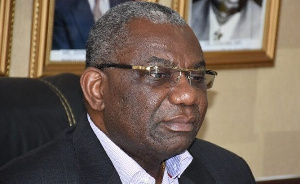 Boakye Kyeremateng Agyarko
Boakye Kyeremateng Agyarko
Former Energy Minister, Boakye Agyarko, has said officials within the Energy Ministry forged his signature and filled forms with it when he was at the Ministry.
However, he said, he was able to detect the forged signatures due to his banking background.
“I saw a lot of things at the ministry. People forged my signature at the Ministry but because of my banking background I was able to detect it,” he said on Net 2 Wednesday, June 30.
He was speaking on matters relating to the $170 million judgement debt Ghana has been slapped with.
He said he is in favour of a thorough investigation into the circumstances that resulted in the $170million judgement debt payment.
Asked whether he supports calls for investigations into the causes of the payment of this debt, he said “By all means, So far as there is a crime why not. I am for investigations all thorough and through. People must be held accountable if found culpable. Lessons must be learnt.”
A London-based United Nations Commission on International Trade Law tribunal has ordered the government of Ghana to pay a contractually defined “early termination payment” of more than US$134.3 million plus interest and costs.
This follows the termination of the contract between the government of Ghana and an independent power producer, Ghana Power Generation Company (GPGC) in 2018.
This has resulted in accusation and counter accusations among officials of the present administration and the previous Mahama administration.
For instance, Former Power Minister Dr Kwabena Donkor told the Attorney General Godfred Yeboah Dame that the $170million judgment debt to the Ghana Power Generation Company (GPGC), was as a result of wrongful termination and not wrongful signing of the agreement.
The Pru East lawmaker told Dzifa Bampoh on the First Take on 3FM Wednesday June 23 that the agreement went through due process before it was signed.
Mr Dame had said the decision by the signatories to sign such an agreement was uninformed.
“The fundamental question that we asked is why the agreement was entered into in the first place? Why did John Jinapor and his former boss execute the signatory of this agreement and afterwards set up a committee to review those agreements?
“It is because you yourself had realised that this was going to result in excess capacity,” he said.
“Indeed, the cost was very, very monumental. As per the report of the PPA Committee, if all the agreements signed by John Jinapor and his former boss had been allowed to run, each year, the nation was going to be exposed to payment to the sum of $586 million.
“Cumulatively, between 2013 and 2018 the nation was going to pay as much as $1.76 billion,” he told Joy News.
Reacting to his comments, Dr Kwabena Donkor told Dzifa that “The awards was given for wrongful termination, not for wrongful signing. I am therefore surprised that the Attorney General does not deem it fit to confirm that whoever terminated will also be referred to the CID.
“The Ghana Power Generation Company (GPGC) was sent to cabinet, it had cabinet approval. Indeed, the Secretary to Cabinet wrote to Parliament on the 3rd of July 2015, and parliament approved the agreement.
“It went through the constitutional process set out for these agreements.
“This agreement had the lowest tariffs of all the emergency power purchasing agreements. It had the shortest duration, four years and that agreement did not require any financial security from the state of Ghana and therefore it was one of the agreements negotiated.”